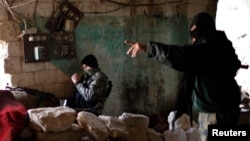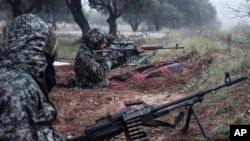TRIPOLI, LIBYA —
The gunmen came for Syrian Islamist rebel commander Thaer al-Waqqas riding in a battered white car. As they arrived, he was shouting orders at a food supply depot in the town of Sermin, a few kilometers from the border with Turkey. He had no time to defend himself as the gunmen got out of the car and riddled him with bullets.
The killing of the northern commander of one of Syria’s largest rebel groups wasn’t carried out by gunmen loyal to Syrian President Bashar al-Assad, but by men supposedly on the rebel side in the nearly two-year-long Syrian civil war.
No one has taken responsibility for the Waqqas’ killing on January 9, but the men of al-Farouq Brigade, the rebel group he led, have no doubt that the gunmen were fighters from Jabhat al-Nusra. This is the Jihadist group that has grown rapidly since its formation a year ago and is now one of the most effective rebel forces fighting to oust Assad.
War within a war
The killing underscores not only the worsening divisions between rebel groups, say diplomats and Middle East experts. It also foreshadows a civil war within the civil war and highlights the growing rift in the region between Islamists and Jihadists. The fear is that the fighting among the rival rebel factions will get worse.
Western media often do not distinguish between Islamists and Jihadists, seeing them as interchangeable. Both groups subscribe to political Islam, believing that Islam should guide social and political as well as personal life. In the past, Islamists and Jihadists have often made common cause, drawn together to defend what they see as the interests of their religion against their own rulers and the largely secular West.
They both adhere to strict interpretations of the Koran and tend to be Salafist – Muslims who stress the importance of following the examples set by the Prophet Mohamed and the earliest Muslims.
Michael Rubin, a former Bush administration official and now a scholar at the Washington D.C.-based think tank, the American Enterprise Institute, says Islamists and Jihadists were aligned most strongly before the so-called Arab Spring uprisings began two years ago. They united against those they considered despots and other, more secular rulers such as Libya’s Moammar Gadhafi, Egypt’s Hosni Mubarak and Tunisia’s Ben Ali, all of whom turned their backs on Islamic fundamentalism.
Jostling for power
But tensions are increasing between the two groups now as they jostle for power and disagree over how to govern. Egyptian liberals may see the country’s new president, Mohamed Morsi, a Muslim Brotherhood leader, as rigid and condemn him for ushering in a constitution they consider too Islamist and undemocratic. But for Jihadists, Morsi is making too many compromises and they reject his readiness to continue honoring the peace treaty with Israel.
“This is a battle within Islam for the right to interpret the Koran and the primary dispute is over individual liberty versus collective identity,” Rubin says. He adds, however, that as Islamists take power in Arab Spring nations, they are being forced to deal with very practical issues and day-to-day demands that often require compromises they are reluctant to consider.
“If you are truly a Jihadist you believe you have a monopoly on the truth and the truth is God-given,” Rubin says.
It isn’t clear what provoked Jihadist gunmen to kill Waqqas. Some rebels say it was in retaliation for the murder four-months ago of an al-Nusra leader. Whatever the cause, the rivalry in northern Syria is growing rapidly between jihadists and the Islamist rebel brigades, such as Farouq, backed by the Muslim Brotherhood.
Not only in Syria
Disputes between the Islamists and jihadists also have sharpened elsewhere in the Middle East and North Africa. Last September, jihadists attacked the U.S. consulate in Benghazi, killing U.S. ambassador Christopher Stevens and three others. That attack earned the sharp reproof of horrified Islamist politicians.
Unnoticed in much of the media coverage of the Benghazi attack was that Libyans trying to protect the U.S. installations were from the Islamist-based militia, the February 17th brigade.
Libyan Islamists in the new government also have resisted a jihadist campaign to rid the country of all landmarks of Sufi Islam. The jihadists consider Sufism heretical and idolatrous.
Omar Ashour, a professor at Britain's University of Exeter, says rivalry between Islamists and Jihadists goes back to well before the Arab Spring. “This rivalry has been there for four decades, from the late 1960s onwards.”
As Ashour sees it, the dispute is “between the ones who say armed tactics are the most effective and legitimate means for social change and those who doubt its effectiveness or legitimacy.”
He points to a sharp disagreement between the Syrian Muslim Brotherhood and a spin-off group, the Fighting Vanguard, who fought an insurgency between 1976 and 1982 against Bashar al-Assad’s father, Hafez. “You also saw violent clashes between Jihadists and Islamists in Algeria and in Egypt in the 1980s,” he says.
Ashour says the rivalry has intensified. “In the aftermath of the Arab Spring revolutions this rivalry has come to the fore. The Islamists have a unique opportunity to make measured changes.”
The killing of the northern commander of one of Syria’s largest rebel groups wasn’t carried out by gunmen loyal to Syrian President Bashar al-Assad, but by men supposedly on the rebel side in the nearly two-year-long Syrian civil war.
No one has taken responsibility for the Waqqas’ killing on January 9, but the men of al-Farouq Brigade, the rebel group he led, have no doubt that the gunmen were fighters from Jabhat al-Nusra. This is the Jihadist group that has grown rapidly since its formation a year ago and is now one of the most effective rebel forces fighting to oust Assad.
War within a war
The killing underscores not only the worsening divisions between rebel groups, say diplomats and Middle East experts. It also foreshadows a civil war within the civil war and highlights the growing rift in the region between Islamists and Jihadists. The fear is that the fighting among the rival rebel factions will get worse.
Western media often do not distinguish between Islamists and Jihadists, seeing them as interchangeable. Both groups subscribe to political Islam, believing that Islam should guide social and political as well as personal life. In the past, Islamists and Jihadists have often made common cause, drawn together to defend what they see as the interests of their religion against their own rulers and the largely secular West.
They both adhere to strict interpretations of the Koran and tend to be Salafist – Muslims who stress the importance of following the examples set by the Prophet Mohamed and the earliest Muslims.
Michael Rubin, a former Bush administration official and now a scholar at the Washington D.C.-based think tank, the American Enterprise Institute, says Islamists and Jihadists were aligned most strongly before the so-called Arab Spring uprisings began two years ago. They united against those they considered despots and other, more secular rulers such as Libya’s Moammar Gadhafi, Egypt’s Hosni Mubarak and Tunisia’s Ben Ali, all of whom turned their backs on Islamic fundamentalism.
Jostling for power
But tensions are increasing between the two groups now as they jostle for power and disagree over how to govern. Egyptian liberals may see the country’s new president, Mohamed Morsi, a Muslim Brotherhood leader, as rigid and condemn him for ushering in a constitution they consider too Islamist and undemocratic. But for Jihadists, Morsi is making too many compromises and they reject his readiness to continue honoring the peace treaty with Israel.
“This is a battle within Islam for the right to interpret the Koran and the primary dispute is over individual liberty versus collective identity,” Rubin says. He adds, however, that as Islamists take power in Arab Spring nations, they are being forced to deal with very practical issues and day-to-day demands that often require compromises they are reluctant to consider.
“If you are truly a Jihadist you believe you have a monopoly on the truth and the truth is God-given,” Rubin says.
It isn’t clear what provoked Jihadist gunmen to kill Waqqas. Some rebels say it was in retaliation for the murder four-months ago of an al-Nusra leader. Whatever the cause, the rivalry in northern Syria is growing rapidly between jihadists and the Islamist rebel brigades, such as Farouq, backed by the Muslim Brotherhood.
Not only in Syria
Disputes between the Islamists and jihadists also have sharpened elsewhere in the Middle East and North Africa. Last September, jihadists attacked the U.S. consulate in Benghazi, killing U.S. ambassador Christopher Stevens and three others. That attack earned the sharp reproof of horrified Islamist politicians.
Unnoticed in much of the media coverage of the Benghazi attack was that Libyans trying to protect the U.S. installations were from the Islamist-based militia, the February 17th brigade.
Libyan Islamists in the new government also have resisted a jihadist campaign to rid the country of all landmarks of Sufi Islam. The jihadists consider Sufism heretical and idolatrous.
Omar Ashour, a professor at Britain's University of Exeter, says rivalry between Islamists and Jihadists goes back to well before the Arab Spring. “This rivalry has been there for four decades, from the late 1960s onwards.”
As Ashour sees it, the dispute is “between the ones who say armed tactics are the most effective and legitimate means for social change and those who doubt its effectiveness or legitimacy.”
He points to a sharp disagreement between the Syrian Muslim Brotherhood and a spin-off group, the Fighting Vanguard, who fought an insurgency between 1976 and 1982 against Bashar al-Assad’s father, Hafez. “You also saw violent clashes between Jihadists and Islamists in Algeria and in Egypt in the 1980s,” he says.
Ashour says the rivalry has intensified. “In the aftermath of the Arab Spring revolutions this rivalry has come to the fore. The Islamists have a unique opportunity to make measured changes.”





